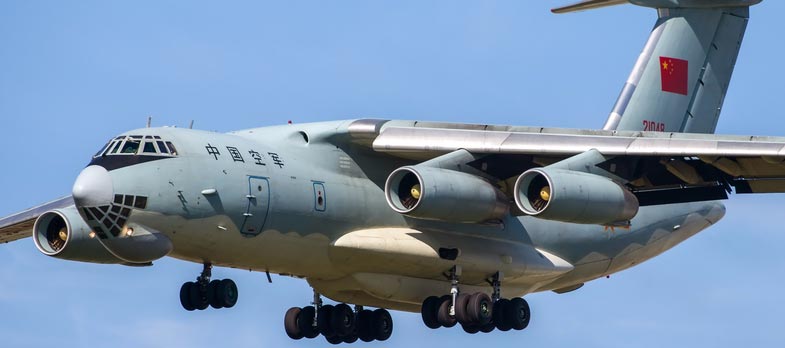A large Chinese military installation will be less than five miles from one of the most important U.S. military bases in the Horn of Africa.
Chinese officials characterized the installation in Djibouti, which has a coastline along the strategic Bab-el-Mandeb at the edge of the Red Sea, as a “logistical support” facility that helps facilitate peacekeeping efforts elsewhere in Africa. But Gen. Thomas Waldhauser, chief of the U.S. Africa Command, challenged that assertion. Not only is it a military base designed to make the Chinese stronger in East Africa, it is a “peer competitor” for Camp Lemonnier, a sprawling compound that is home to over 4,000 servicemembers and contractors. As a result, there may be “significant operational security concerns” when the base becomes fully operational. In addition to Chinese and American forces, Djibouti is home to Japanese and French military forces. Most of the non-American assets are dedicated to decreasing piracy in the Red Sea area, and Chinese officials boast that their warships have successfully escorted over 6,000 ships through the Gulf of Aden. However, many fear that the Chinese base may be a sign of further escalation. Chinese submarines are active in the Indian Ocean, and Chinese warships already have access to a port in Pakistan.
Chinese Foreign Ministry spokesperson Hong Lei insisted that the base was a joint effort between the two governments to help ensure regional security; Gen. Waldhauser said that his office “has spoken to the Djiboutian government about it” and made their concerns known.
Instability in the Horn and Lower Arabian Peninsula
This stepped-up foreign military presence comes at a critical time. For much of recent history, this region has been fraught with instability. The Bab-el-Mandeb strait is one of the main exits from the Suez Canal, which is one of the busiest waterways in the world. It is as important as the Strait of Hormuz, the narrow strip of water between the UAE and Iran.
This instability comes from several different areas, all of which are fertile ground for contractor intervention:
- Somali Pirates: The origins of these pirates are somewhat obscure, as some claim that they are terrorist-related while other evidence suggests that these “pirates” are simply displaced fishermen looking to earn a living any way possible. These pirates have cost shipping companies over $6 billion since 2005.
- Al Qaeda: “The Base” began operating in the lower Arabian Peninsula in 1998; since 2015, the terrorist group has waged a civil war against the Saudi and U.S.-backed Yemeni government.
- Al Shabaab: “The Youngsters” is an al Qaeda-affiliated group of militants that operates largely in Somalia. In September 2014, a U.S. drone strike killed one of the group’s leaders, and al Shabaab is now relatively dormant, at least for the time being.
- Jahba East Africa: As al Shabaab’s power wanes, this ISIS-affiliated group has stepped up operations in the area. In October 2016, the militants briefly occupied Qandala, a small port city in Somalia.
- Boko Haram: In 2015, one international group called this ISIS-linked group the most deadly terrorist organization in the world. Since roughly 2009, its forces have killed about 20,000 people and displaced almost three million others. For now, Boko Haram is to the west of the Horn in the Nigeria area, but with the rise of Jahba East Africa, that could change.
In the United States, contractor deployments into areas like the Horn of Africa are often politically preferable to higher Army or Marine Corps troop levels. Furthermore, many contractors have skill sets that regular servicemembers do not have.
Compensation for Injured Contractors
Because of Camp Lemonnier and other American military assets in the immediate region, the entire Horn of Africa/Yemen area is probably a war zone under the Defense Base Act. As a result, this legislation applies to any contractors who are injured while working for the DoD, State Department, Peace Corps, or any other government agency operating in the area. The DBA also arguably applies to contractors who work for the Yemeni government and certain other sympathetic foreign regimes.
Injured contractors do not need to prove fault to obtain benefits. Furthermore, the injury need not occur while the victim was “on the clock” or on post, as any injury that occurs in-country and is rationally related to the contractor’s job is a covered injury. This would include things like ambushes that happen offsite and training injuries.
Contractors who are hurt receive two-thirds of their average weekly wage for the period of disability. That includes both hospitalization time and any time in physical rehabilitation. Contractors who are permanently disabled, either totally or partially, can receive a one-time payment that is based on the severity of the injury, or they can potentially receive benefits for their lifetime..
The DBA also takes care of medical bills. That includes everything from emergency care through physical rehabilitation. That also includes incidental expenses, like travel costs, prescription drugs, and medical devices.
Anywhere contractors operate, the DBA provides financial benefits and peace of mind. To start your claim for damages, call Barnett, Lerner, Karsen & Frankel.

